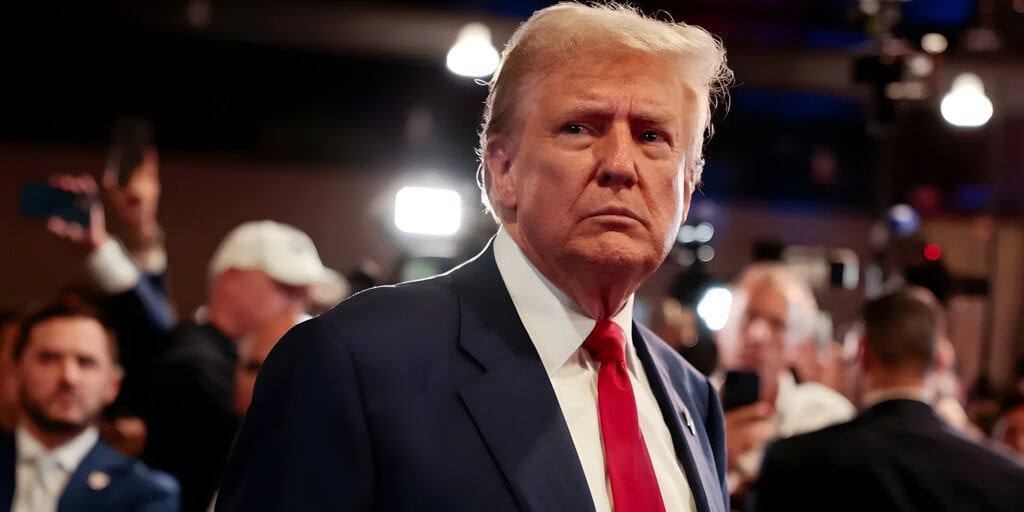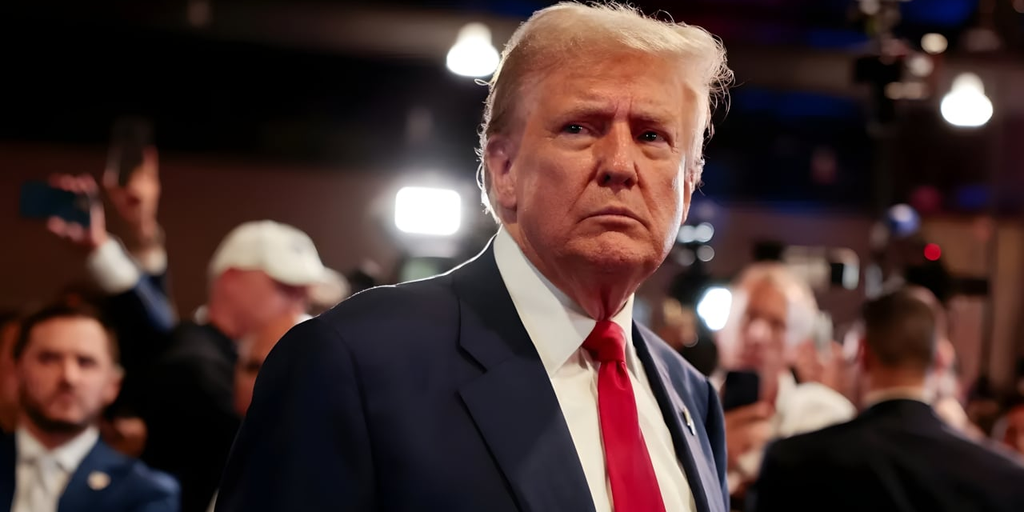Law and Order
Hawk Tuah Girl Wakes Up, Plays Ball With Lawyers Suing Meme Coin Makers
Published
3 months agoon
By
admin

After 372 hours, Haliey Welch, better known as the Hawk Tuah girl, has finally woken from her slumber to announce she’s made some new friends—namely, the same law firm that’s suing her business partners over her failed meme coin project.
Sixteen days ago, Welch’s would-be meme coin debut, a Solana token called HAWK, imploded at launch, enriching an apparently interconnected web of early investors and leaving most retail traders in the lurch. That evening, Welch told an irate audience on an X Spaces that she was going to bed and would see everyone in the morning—before going radio silent for weeks on end.
On Friday, Welch broke that silence by announcing she is cooperating with the law firm that sued the HAWK token’s creators Thursday for allegedly violating American securities laws.
I take this situation extremely seriously and want to address my fans, the investors who have been affected, and the broader community. I am fully cooperating with and am committed to assisting the legal team representing the individuals impacted, as well as to help uncover the…
— Haliey Welch (@HalieyWelchX) December 20, 2024
“I am fully cooperating with and am committed to assisting the legal team representing the individuals impacted, as well as to help uncover the truth, hold the responsible parties accountable, and resolve this matter,” Welch said on X (formerly known as Twitter).
A spokesperson for Welch told Decrypt that the influencer was “totally siloed” from the HAWK project and “had zero control over it.”
The spokesperson also asserted that Welch only received a fixed sponsorship fee for lending her likeness to the meme coin project, adding “there was no guarantee she would make any additional money from the meme coin thereafter.”
That story runs somewhat counter to one put forward earlier this week by the team taking responsibility for building most of HAWK. The crypto token launch platform OverHere said on Tuesday that it only took leadership over the doomed token because one of Welch’s associates, a mysterious figure known as “Doc Hollywood,” “vanished when things got hard.”
The OverHere team claimed it took zero fees from HAWK and made zero profit on the project, and pointed the finger at Welch and Doc Hollywood for an alleged lack of transparency.
The lawsuit filed Thursday against the project—by 12 American plaintiffs claiming to have suffered damages in excess of $151,000 from the project—listed OverHere as one of multiple defendants. It did not list Welch.
Alexandra Roberts, a law professor at Northeastern University, told Decrypt that she has never before seen a situation like this—in which a celebrity such as Welch has actively aided a lawsuit aimed at a project the celebrity lent their likeness to.
“I think it’s a great PR move,” Roberts said. “I think she’s trying to get out in front of it and make a really clear statement: ‘Not only did I not know what was going on, but I want to advocate on behalf of the people who were swindled.’”
Burwick Law, the firm suing HAWK’s creators, told Decrypt that it does not represent Welch, but is in conversations with her counsel.
When asked why Welch was not listed as a co-defendant in the HAWK lawsuit, Max Burwick, managing partner at Burwick Law, said the decision was intentional, and hinted it might help make his clients whole sooner.
“In this matter, we have chosen the strategy we believe to be most effective in helping our clients achieve meaningful results,” Burwick told Decrypt.
Edited by Andrew Hayward
Daily Debrief Newsletter
Start every day with the top news stories right now, plus original features, a podcast, videos and more.
Source link
You may like


XRP Price Reversal Toward $3.5 In The Works With Short And Long-Term Targets Revealed


Former New York governor advised OKX over $505M federal probe: Report


First Digital USD (FDUSD) Depegs After Justin Sun Alleges Firm Is ‘Insolvent’ and Not Fulfilling Redemptions


Gen Z’s Bitcoin Bet, The Largest Wealth Transfer In History?


Trump’s Crypto Conflicts Dominate Stablecoin Legislation Debate


First Digital denies allegations, threatens legal action
Law and Order
Trump’s Crypto Conflicts Dominate Stablecoin Legislation Debate
Published
6 hours agoon
April 2, 2025By
admin

A House Financial Services Committee markup of stablecoin legislation appeared to go off course Wednesday, with Democrats spending hours hammering home the same message: Democrats would in principle support the STABLE Act, but see President Donald Trump’s personal involvement in the stablecoin sector as an unacceptable conflict of interest.
Multiple Democrats, including a co-sponsor of the STABLE Act itself, offered amendments to the bill on Wednesday that would have prevented the president, his cabinet, the first lady, and special government employees like Elon Musk from offering stablecoin products while in office.
One by one, over the course of hours, those amendments were shot down by voice vote the Committee’s slim Republican majority.
Republican leadership countered the proposals by arguing the STABLE Act currently requires all issuers to comply with the same rules, and that boxing out certain issuers—even the sitting president himself—would stifle market competition. The Act would create a set of rules, involving compliance with anti-money laundering laws and reserve audits, that all stablecoin issuers would have to comply with to operate in American markets.
“We’re not picking winners and losers here,” Committee Chair French Hill (R-AR) said. “If you don’t want to use a payment stablecoin, don’t use one.”
Numerous Democrats took issue with the position that the Trump family’s recently announced stablecoin, the World Liberty Financial USD1 token, should be treated like any other.
“He is unlike any other issuer because he’s the president of the United States,” Rep. Stephen Lynch (D-MA) retorted. “And he’s going to take U.S. taxpayer money to assist his family business when it gets in trouble.”
Stablecoins are digital assets pegged to the U.S. dollar that allow cryptocurrency traders to enter and exit positions without the need to access dollars directly. Some stablecoin issuers, like the Trump-backed World Liberty Financial, purport to strengthen U.S. dollar hegemony by encouraging the use of dollar-backed assets in both foreign and digital asset markets. But absent a regulatory framework in the United States, the legality of such products remains in question.
The Trump family’s lucrative crypto investments have caused some controversy ever since the president returned to the White House, where he is currently overseeing the creation of the nation’s first ever digital assets regulatory framework. But the Trump family’s announcement last week of a stablecoin product—right at the moment that stablecoin legislation is moving quickly through both chambers of Congress—appears to have struck a particularly resonant chord with Democrats.
The timing appears to have been inadvertent. A source with direct knowledge of the matter told Decrypt that World Liberty did not intend to roll out its stablecoin so soon. The revelation of blockchain data concerning the product, though, appears to have forced the team’s hand.
It remains unclear whether the flare up over Trump’s crypto dealings will meaningfully change the calculus when it comes to bipartisan support for the STABLE Act, which has until now been widely expected to earn a fair number of Democrat votes. One House Financial Services Committee staffer told Decrypt Wednesday they do not anticipate much has changed after today’s mark up, in terms of Democrat support for the bill.
And yet on Monday, Rep. Hill, the Committee’s Republican chair, took the rare step of conceding that Trump’s crypto dealings—particularly, the president’s stablecoin and meme coin projects—have made the task of creating legislation in the same areas “more complicated.”
Some Democrats already cosponsoring the STABLE Act, including Rep. Sam Liccardo (D-CA), issued forceful rebukes of Trump’s crypto dealings on Wednesday. Liccardo said the need to prevent high-ranking officials like Trump from offering their own stablecoins was “self-evident and obvious,” and highlighted the potential for such tokens to offer foreign actors a means to curry favor with the president.
Another House staffer familiar with the work of the House Financial Services Committee told Decrypt, however, that Democrats who already cosponsored the bill embraced it last month as it was written then—and are unlikely to change their positions over tweaks that, while important, may not be existential.
“You can connect the dots on what will happen if those amendments don’t get in,” the staffer said.
Daily Debrief Newsletter
Start every day with the top news stories right now, plus original features, a podcast, videos and more.
Source link
Law and Order
Crypto-Backed Candidates Patronis and Fine Win Key Florida Seats
Published
22 hours agoon
April 2, 2025By
admin

Republican candidates Jimmy Patronis and Randy Fine secured victories in Florida’s special congressional elections Tuesday night, extending the GOP’s narrow House majority with significant backing from crypto industry super PACs.
Fine captured 56.7% of the vote in Florida’s 6th District against Democrat Josh Weil, while Patronis won Florida’s 1st District with 57% against Gay Valimont.
Both campaigns received substantial support from Defend American Jobs, a Republican-focused crypto PAC operating within the broader Fairshake political funding network.
Those wins represent yet another victory for crypto industry interests.
Patronis and Fine “have shown a deep commitment to advancing pro-growth policies and ensuring the U.S. leads the world in crypto and digital asset innovation,” Defend American Jobs said in an emailed statement to Decrypt after the results.
“Their election is a win for jobs, innovation, and American leadership.”
While Fine’s 14-point win margin shows a significant contraction from President Trump’s 30-point advantage in the same district last November, it’s worth mentioning that Weil had a $10 million war chest compared to Fine’s roughly $1 million.
In January, Fairshake raised over $116 million, which has been directed toward spending for the 2026 midterms, Decrypt reported.
Fairshake is affiliated with Defend American Jobs and Protect Congress. By the time the 2024 elections began, the network had invested some $133 million toward its cause.
Those efforts have helped secure GOP seats across the board in recent months and are intended to win favorable regulatory support in the years ahead.
With crypto legislation on stablecoins and market structure pending in Congress, the two new electoral wins could help solidify the slim Republican majority needed to advance pro-crypto bills.
Leading firms and leaders in the space—including exchange operator Coinbase, blockchain payments company Ripple, tech investor Andreessen Horowitz, and Gemini co-founders Cameron and Tyler Winklevoss—have all donated to Fairshake’s efforts.
Edited by Sebastian Sinclair
Daily Debrief Newsletter
Start every day with the top news stories right now, plus original features, a podcast, videos and more.
Source link
Law and Order
Kristin Smith Steps Down as Blockchain Association CEO to Lead Solana’s Policy Push
Published
1 day agoon
April 1, 2025By
admin

Blockchain Association CEO Kristin Smith will resign next month from her role at the prominent crypto-focused industry group that helped elect the U.S.’ first pro-crypto president to lead Layer-1 blockchain Solana’s new policy push.
Smith will begin a new role as president of Solana’s Policy Institute on May 19, she said Tuesday in an X post. Her last day at the Blockchain Association will be May 16.
The Blockchain Association’s Board of Directors has already begun the search for Smith’s successor, the group’s communications lead Curtis Kincaid told Decrypt.
“We’ve grown from a small group of passionate advocates into a leading force in Washington, D.C., and beyond,” Smith said in the X post. “Blockchain Association today is stronger than ever.”
Founded in 2018, the Blockchain Association is one of several industry groups that has fought to advance the crypto industry’s interests on Capitol Hill. Their efforts helped lead to the election of pro-crypto President Donald Trump last November—a watershed moment for an industry that had previously existed on tenterhooks.
But as digital asset firms’ clout in Washington D.C. has grown, so too have calls to enshrine even more of the industry’s interests into law. To meet that demand, a few Layer-1 blockchains have launched policy institutes. Now, Solana is joining them.
Edited by James Rubin
Daily Debrief Newsletter
Start every day with the top news stories right now, plus original features, a podcast, videos and more.
Source link

XRP Price Reversal Toward $3.5 In The Works With Short And Long-Term Targets Revealed

Former New York governor advised OKX over $505M federal probe: Report

First Digital USD (FDUSD) Depegs After Justin Sun Alleges Firm Is ‘Insolvent’ and Not Fulfilling Redemptions

Gen Z’s Bitcoin Bet, The Largest Wealth Transfer In History?

Trump’s Crypto Conflicts Dominate Stablecoin Legislation Debate

First Digital denies allegations, threatens legal action

Crypto Firm Galaxy Secures UK FCA Approval for License to Expand Derivatives Trading

Why Is The Bitcoin Price Surging Today?

Cardano Founder Reveals What Will Onboard 3 Billion New Users Into Crypto

Sentient open-source AI search outperforms GPT-4o and Perplexity

Memecoin Collapse Creates Perfect Moment for TradFi To Launch ‘Trusted Assets,’ According to Chris Burniske

Breez Announces Launch Of New Wallet, Misty Breez

Alabama, Minnesota Advance Bitcoin Reserve Plans With Companion Bills

Bitfarms secures $300m loan to fuel AI and data center growth

Crypto Hackers Stole $1.67B in Q1, a 300% Rise From Previous Quarter: CertiK

Arthur Hayes, Murad’s Prediction For Meme Coins, AI & DeFi Coins For 2025

Expert Sees Bitcoin Dipping To $50K While Bullish Signs Persist

Aptos Leverages Chainlink To Enhance Scalability and Data Access

Bitcoin Could Rally to $80,000 on the Eve of US Elections

Sonic Now ‘Golden Standard’ of Layer-2s After Scaling Transactions to 16,000+ per Second, Says Andre Cronje

Crypto’s Big Trump Gamble Is Risky

Institutional Investors Go All In on Crypto as 57% Plan to Boost Allocations as Bull Run Heats Up, Sygnum Survey Reveals

Ripple-SEC Case Ends, But These 3 Rivals Could Jump 500x

Has The Bitcoin Price Already Peaked?

A16z-backed Espresso announces mainnet launch of core product

Xmas Altcoin Rally Insights by BNM Agent I

Blockchain groups challenge new broker reporting rule

The Future of Bitcoin: Scaling, Institutional Adoption, and Strategic Reserves with Rich Rines

Trump’s Coin Is About As Revolutionary As OneCoin

Is $200,000 a Realistic Bitcoin Price Target for This Cycle?
Trending

 24/7 Cryptocurrency News5 months ago
24/7 Cryptocurrency News5 months agoArthur Hayes, Murad’s Prediction For Meme Coins, AI & DeFi Coins For 2025

 Bitcoin3 months ago
Bitcoin3 months agoExpert Sees Bitcoin Dipping To $50K While Bullish Signs Persist

 24/7 Cryptocurrency News3 months ago
24/7 Cryptocurrency News3 months agoAptos Leverages Chainlink To Enhance Scalability and Data Access

 Bitcoin5 months ago
Bitcoin5 months agoBitcoin Could Rally to $80,000 on the Eve of US Elections

 Altcoins2 months ago
Altcoins2 months agoSonic Now ‘Golden Standard’ of Layer-2s After Scaling Transactions to 16,000+ per Second, Says Andre Cronje

 Opinion5 months ago
Opinion5 months agoCrypto’s Big Trump Gamble Is Risky

 Bitcoin5 months ago
Bitcoin5 months agoInstitutional Investors Go All In on Crypto as 57% Plan to Boost Allocations as Bull Run Heats Up, Sygnum Survey Reveals

 Price analysis5 months ago
Price analysis5 months agoRipple-SEC Case Ends, But These 3 Rivals Could Jump 500x


